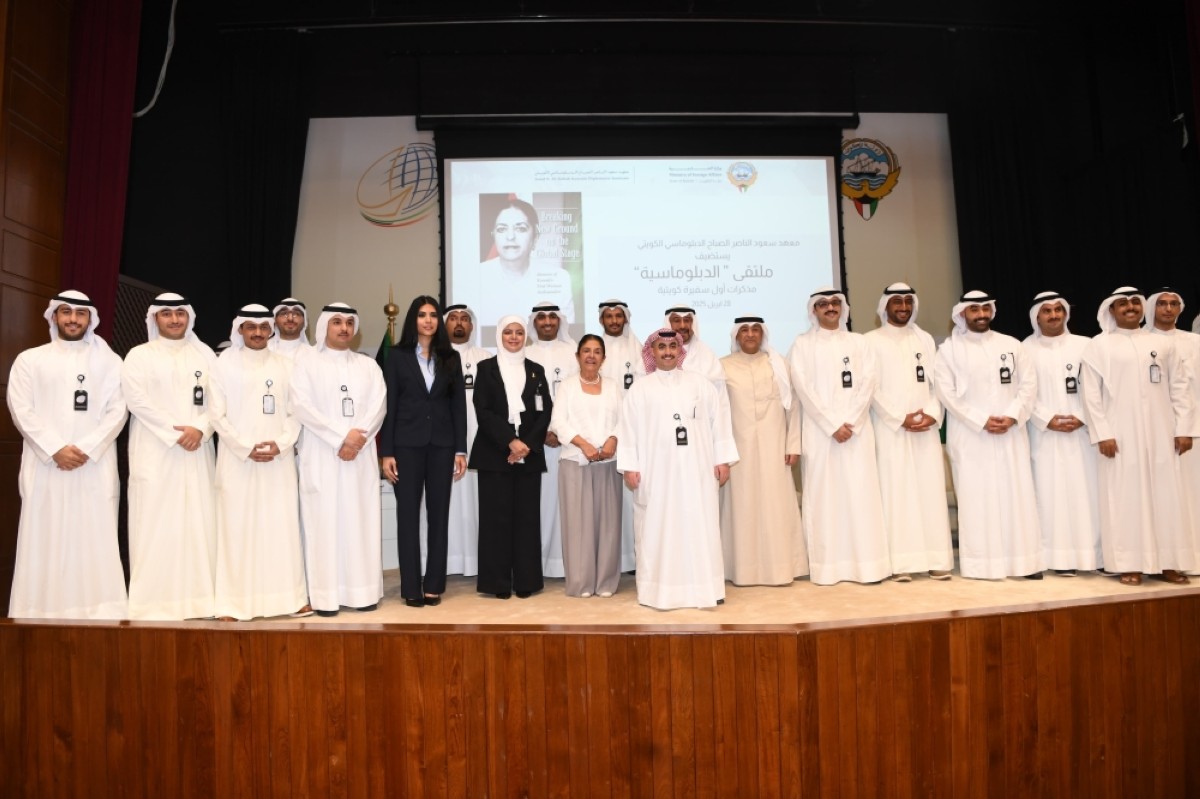KUWAIT: Assistant Foreign Minister for the Diplomatic Institute Nasser Al-Subaih praised the pioneering role played by Kuwaiti women in diplomacy, noting that the ministry of foreign affairs has been and continues to be rich with distinguished figures who have left a significant impact locally, regionally and internationally — among the most prominent of whom is Ambassador Nabeela Abdulla Al-Mulla.
Speaking during the launch of “Breaking New Ground on the Global Stage”, the first book by Kuwait’s and the GCC’s first woman Ambassador, Al-Subaih stated that he had the honor of working alongside her during his time as a member of Kuwait’s mission to the United Nations in Vienna, where Al-Mulla served as Kuwait’s Permanent Representative. “I worked alongside Ambassador Al-Mulla for two years and learned a great deal from her,” he said.
Al-Subaih expressed his pride in the accomplishments of Kuwaiti women, emphasizing that they have achieved remarkable successes and held honorable positions, standing out among women across the Gulf and Arab world.
Ambassador Nabeela Al-Mulla
Assistant Foreign Minister for the Diplomatic Institute Nasser Al-Subaih
In a separate context, responding to journalists’ questions about the Gulf Cooperation Council’s (GCC) ability to adopt unified stances toward regional challenges, Al-Subaih affirmed that the GCC remains united with firm and clear positions. He explained that ministerial and summit statements consistently reflect the unity and shared vision of the Gulf nations. “The GCC was built on the foundations of unity and continues to work toward strengthening it, especially in light of current regional and international circumstances that demand more consultation and coordination to produce clear positions that express the shared destiny of the Gulf States,” he added.
During his speech at the event, Al-Subaih also noted that Ambassador Al-Mulla’s book offers a vivid portrayal of her practical diplomatic experience, chronicling her journey from her early beginnings to her ascension to the highest levels of diplomatic work. “This book serves as documentation of an honorable diplomatic career, through which Ambassador Al-Mulla embodied the highest standards of Kuwaiti diplomatic excellence on the international stage,” he said.
Ambassador Al-Mulla explained that the idea of documenting her professional journey was not a spur-of-the-moment decision, but a long-standing dream fueled by her belief in the importance of preserving the experiences of officials. “The lack of documentation is a challenge in many Third World and Arab countries, where researchers often have to rely on British or German archives due to the scarcity of local, documented sources,” she said.
Al-Mulla praised initiatives such as those by the emirate of Sharjah in collecting historical documents but expressed hope that her book would inspire other officials to document their careers. She noted that although her decision to write came relatively late, her strong desire to share her unique professional journey with young people and readers ultimately motivated her to move forward.
She emphasized that she faced many obstacles but overcame them through perseverance and the support she received from the country’s leadership, her family, and her friends. The book, she explained, covers key moments such as her role in adopting the preliminary decision to establish international forces in Lebanon in 1978, her participation in international resolutions addressing the Iraqi invasion and occupation of Kuwait in 1990, and her involvement with the Iranian nuclear file in 2003.
On the role of the Diplomatic Institute, Al-Mulla stressed the importance of its development, highlighting the need for greater openness to other diplomatic academies and the adoption of international training programs and exchange initiatives. “I believe there is vast potential for more openness, and we must capitalize on it to enhance the expertise of our diplomats,” she said.
She emphasized the need to encourage all members of the ministry of foreign affairs to participate in training programs and professional experiences in major global hubs such as the United Nations, not only in New York but also in Geneva, the European Union, Vienna, the IAEA and the Arab League. Al-Mulla called on young people to read the book carefully and extract lessons and insights, stressing that documentation is not just about preserving events but about building political and intellectual awareness for the future.


















